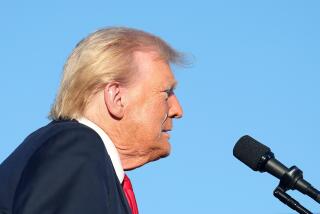A novel of dangerous ideas
In Nicholson Baker’s new novella, “Checkpoint,” a man sits in a Washington hotel room with a friend and talks about assassinating President Bush.
It’s a work of the imagination, and no attempts on the president’s life are made, but the novel is likely to be incendiary, along the lines of Michael Moore’s “Fahrenheit 9/11.”
Alfred A. Knopf is planning to publish Baker’s 115-page work Aug. 24, on the eve of the Republican National Convention. It will sell for $18.
In the book, two men -- Ben and Jay -- meet at the fictional Adele Hotel and Suites in Washington. It is midday. They eat a bag of bagel chips and order lunch from room service. They talk into a tape recorder.
Ben: Obviously you have something on your mind.
Jay: That’s true.
Ben: You could begin with that.
Jay: OK. Uh. I’m going to -- OK. I’ll just say it. Um.
Ben: What is it?
Jay: I’m going to assassinate the president.
Though it is illegal to threaten the president in real life, a work of fiction is usually protected by the 1st Amendment.
“Under the logic of a 1968 Supreme Court precedent, Brandenburg vs. Ohio, speaking of assassinating the president cannot be forbidden or punished unless the speaker’s purpose is to provoke an assassination attempt and that is likely to be the effect,” says legal scholar Stuart Taylor Jr., of the National Journal. “It’s quite possible in the wake of more recent developments -- 9/11 especially -- the court might modify that in some kinds of cases. But it’s almost inconceivable that the court would allow punishment of a novelist for what one of his characters says about killing the president.”
“Without seeing the work,” says Charles Bopp, a spokesman for the Secret Service, “a determination can’t be made at this time.”
Books have played roles in certain American tragedies. Timothy J. McVeigh handed out copies of “The Turner Diaries” before the Oklahoma City bombing. John Hinckley Jr., would-be assassin of Ronald Reagan, and Mark David Chapman, who killed John Lennon, both carried copies of “The Catcher in the Rye.” James Edward Perry followed 22 of the tips in “Hit Man: A Technical Manual for Independent Contractors” in the 1993 Silver Spring, Md., contract killings of Mildred Horn, her quadriplegic son and his nurse, according to prosecutors.
Baker’s fiction is written like a script for a two-man play, satirical at some points, serious at others. There are fanciful flourishes and fierce fits of anger.
The critically admired Baker is a master of written-from-a-weird-angle fiction. His novel “Vox” was basically a phone-sex conversation. And “The Mezzanine” is a 135-page meditation on an escalator ride.
In “Checkpoint,” the main character, Jay, rants and rages against Bush. He says he hasn’t felt so much hostility against any other president -- not Richard Nixon, not Reagan. Jay says Bush is “beyond the beyond. What he’s done with this war. The murder of the innocent. And now the prisons. It’s too much. It makes me so angry. And it’s a new kind of anger.”
He is outraged that U.S. armed forces have used napalm-like bombs in Iraq. He says: “It’s improved fire jelly -- it’s even harder to put out than the stuff they used in Vietnam. And Korea. And Germany. And Japan. It just has another official name. Now it’s called Mark 77. I mean, have we learned nothing?”
Much of the book is serious polemic, based on Baker’s reporting. The title, “Checkpoint,” comes from a story that Jay read in the Sydney Morning Herald about a Shiite family of 17 that was seeking a haven in southern Iraq in 2003. At a checkpoint south of Karbala, U.S. forces opened fire on the family’s Land Rover. Several family members died; two girls were decapitated by the gunfire.
Some of the ways Jay envisions killing the president are ludicrous. One is radio-controlled flying saws that “look like little CDs but they’re ultra-sharp and they’re totally deadly.” Another is a remote-controlled boulder made of depleted uranium. “You’re going to squash the president?” Ben asks Jay.
But Jay also has a gun and some bullets. And Ben realizes at one point that even if Jay is crazy, he is still talking about killing a sitting president. “If the FBI and the Secret Service ... come after me because I’ve been hanging out with you in a hotel room before you make some crazy attempt on the life of the president, I’m totally cooked,” Ben says. “Yes, you were talking a lot of delusional gobbledygook about homing bullets, but basically your intent was clear. I’ll have to say that. I’m scared.”
Jay calls Bush an “unelected ... drunken OILMAN” who is “squatting” in the White House and “muttering over his prayer book every morning.”
He calls Vice President Dick Cheney and Defense Secretary Donald H. Rumsfeld “rusted hulks” and “zombies” who have “fought their way back up out of the peat bogs where they’ve been lying, and they’re stumbling around with grubs scurrying in and out of their noses and they’re going, ‘We -- are -- your -- advisers.’ ”
Of Cheney, Jay says “corruption has completely hunched and gnarled him. His mouth is pulled totally over on one side of his face.”
The novel, says Knopf spokesman Paul Bogaards, “is a portrait of an anguished protagonist pushed to extremes. Baker is using the ... story structure as a narrative device to express the discontent many in America are feeling right now.”
Bogaards says, “It is not the first time a novelist has chosen fiction to express their point of view about American society or politics. Upton Sinclair did it. So did John Steinbeck. Nick Baker does it with more nerve and fewer pages.”
More to Read
Sign up for our Book Club newsletter
Get the latest news, events and more from the Los Angeles Times Book Club, and help us get L.A. reading and talking.
You may occasionally receive promotional content from the Los Angeles Times.






